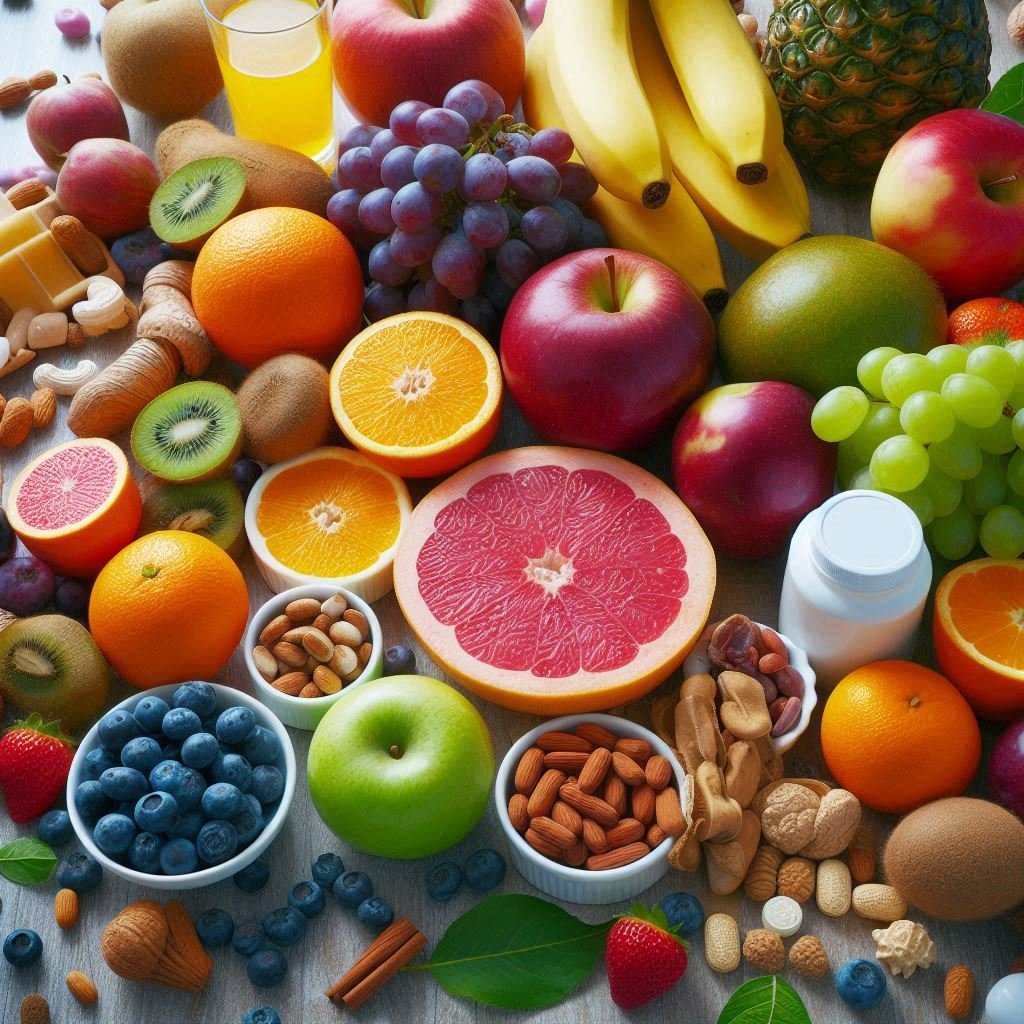Fruits are nature’s true gems, offering a remarkable array of nutrients, vitamins, and antioxidants that can profoundly impact our overall health and well-being. From boosting our immune system to aiding in weight management, the benefits of incorporating fruits into our daily lives are truly remarkable. In this comprehensive article, we will explore the incredible nutritional powerhouse that fruits represent, delving into their specific health advantages and how they can contribute to a healthier lifestyle.
Introduction to Fruits as a Nutritional Powerhouse
Fruits are the edible, ripened ovaries of flowering plants, and they come in a vast array of colors, flavors, and textures. These natural wonders are not only delightful to the taste buds but also packed with an impressive array of essential nutrients, vitamins, and minerals that are crucial for human health. Whether it’s the juicy sweetness of a ripe mango, the refreshing crunch of an apple, or the tart tanginess of a grapefruit, fruits offer a unique and diverse culinary experience that can elevate our overall well-being.
The Incredible Health Benefits of Fruits
Incorporating fruits into our daily diet can have a profound impact on our physical and mental well-being. Here are some of the incredible health benefits that fruits offer:
- Immune System Boost: Fruits are rich in antioxidants, vitamins, and minerals that work together to strengthen the immune system, helping the body fight off infections and diseases more effectively.
- Reduced Risk of Chronic Diseases: Many fruits are packed with fiber, which can help lower cholesterol levels and reduce the risk of heart disease, stroke, and certain types of cancer.
- Improved Digestive Health: The fiber in fruits can also aid in maintaining a healthy digestive system, promoting regular bowel movements and reducing the risk of constipation and other gastrointestinal issues.
- Enhanced Brain Function: Certain fruits, such as blueberries and strawberries, contain compounds that can improve cognitive function, memory, and focus, making them a valuable addition to a brain-healthy diet.
- Skin and Hair Health: Many fruits are rich in vitamins and antioxidants that can nourish the skin, promoting a healthy, youthful glow and supporting the growth of strong, lustrous hair.
The Importance of Including Fruits in Your Diet
Incorporating fruits into your daily diet is crucial for maintaining optimal health and well-being. Here’s why:
- Nutrient-Dense: Fruits are packed with essential vitamins, minerals, and other beneficial plant compounds that are difficult to obtain from other food sources.
- Disease Prevention: The antioxidants and phytochemicals found in fruits can help reduce the risk of chronic diseases, such as heart disease, cancer, and type 2 diabetes.
- Weight Management: Fruits are generally low in calories and high in fiber, making them a filling and satisfying snack or addition to meals, which can aid in weight management and weight loss efforts.
- Hydration: Many fruits, such as watermelon and oranges, are high in water content, which can contribute to overall hydration and support various bodily functions.
- Versatility: Fruits can be enjoyed in a wide variety of ways, from fresh and raw to cooked, baked, or blended into smoothies, making them a versatile and convenient addition to any diet.
Nutritional Value of Fruits and Their Role in Disease Prevention
Fruits are true nutritional powerhouses, packed with an impressive array of vitamins, minerals, and other beneficial plant compounds. Here’s a closer look at the nutritional value of fruits and how they can contribute to disease prevention:
- Vitamins and Minerals: Fruits are rich in essential vitamins, such as vitamin C, vitamin A, and B vitamins, as well as important minerals like potassium, magnesium, and fiber.
- Antioxidants: Many fruits, such as berries, pomegranates, and citrus fruits, are high in antioxidants, which can help neutralize harmful free radicals and reduce inflammation in the body.
- Phytochemicals: Fruits contain a variety of phytochemicals, such as carotenoids, flavonoids, and polyphenols, which have been linked to a reduced risk of chronic diseases, including certain types of cancer and heart disease.
- Fiber: Fruits are an excellent source of dietary fiber, which can help regulate bowel movements, lower cholesterol levels, and promote a healthy gut microbiome.
- Disease Prevention: The nutrient-rich composition of fruits can contribute to a reduced risk of various chronic diseases, including heart disease, type 2 diabetes, and certain types of cancer.
How Fruits Contribute to Weight Management and Overall Well-Being
Incorporating fruits into your diet can be a powerful tool for weight management and overall well-being. Here’s how:
- Low in Calories: Most fruits are relatively low in calories, making them a nutrient-dense and filling option for snacks or as part of a balanced meal.
- High in Fiber: The fiber in fruits can help promote feelings of fullness and satiety, which can curb overeating and support weight management efforts.
- Hydration: Many fruits, such as watermelon and citrus fruits, are high in water content, which can contribute to overall hydration and support various bodily functions.
- Improved Gut Health: The fiber and beneficial plant compounds in fruits can nourish the gut microbiome, promoting a healthy digestive system and overall well-being.
- Mood and Energy Boost: The natural sugars and vitamins in fruits can provide a quick energy boost and potentially improve mood and cognitive function.
Fruits vs. Vegetables: A Comparison of Nutritional Benefits
While both fruits and vegetables are essential components of a healthy diet, they offer distinct nutritional profiles and benefits. Here’s a comparison:
| Characteristic | Fruits | Vegetables |
|---|---|---|
| Carbohydrate Content | Generally higher | Generally lower |
| Fiber Content | Moderate to high | Moderate to high |
| Vitamin and Mineral Content | Varied, often high in vitamins C and A | Varied, often high in vitamins K and A |
| Antioxidant Content | Generally high | Varied, often high in certain antioxidants |
| Calorie Content | Moderate to high | Generally lower |
| Culinary Use | Typically consumed as a sweet or tart snack or dessert | Typically consumed as a savory side dish or as part of a main meal |
While both fruits and vegetables are essential for a balanced and nutritious diet, incorporating a variety of both can provide a comprehensive range of essential nutrients and health benefits.
Creative Ways to Incorporate More Fruits into Your Diet
Incorporating more fruits into your daily diet can be a delicious and enjoyable way to improve your overall health. Here are some creative ideas to help you get started:
- Fruit-Infused Water: Add sliced fruits, such as citrus, berries, or watermelon, to your water to create a refreshing and flavorful infusion.
- Fruit Smoothies: Blend your favorite fruits with yogurt, milk, or plant-based milk alternatives for a nutrient-dense and satisfying smoothie.
- Fruit Salads and Parfaits: Layer fresh or grilled fruits with yogurt, granola, or chia seeds for a healthy and delightful breakfast or snack.
- Fruit-Based Desserts: Enjoy baked or grilled fruits, such as apples, peaches, or pineapple, as a healthier alternative to traditional desserts.
- Fruit Snacks: Keep a variety of fresh, dried, or frozen fruits on hand for a quick and convenient snack option.
- Fruit-Infused Oatmeal: Top your morning oatmeal with sliced fruits, such as bananas, berries, or diced apples, for a nutritious and filling breakfast.
- Fruit-Filled Baked Goods: Incorporate fruits into your baking, such as muffins, scones, or pies, for a delicious and nutritious treat.
- Fruit-Based Condiments: Experiment with fruit-based sauces, jams, or chutneys to add a unique and flavorful twist to your meals.
Popular Fruits and Their Specific Health Benefits
Fruits come in a vast array of varieties, each offering its own unique set of health benefits. Here are some of the most popular fruits and their specific advantages:
- Apples: Rich in fiber, antioxidants, and vitamins, apples have been linked to a reduced risk of heart disease, diabetes, and certain types of cancer.
- Bananas: High in potassium, fiber, and vitamin B6, bananas can help regulate blood pressure, support digestive health, and provide a natural energy boost.
- Blueberries: Known for their high antioxidant content, blueberries have been shown to improve brain function, enhance memory, and support a healthy immune system.
- Citrus Fruits (Oranges, Lemons, Limes): Packed with vitamin C, these fruits can boost the immune system, aid in skin health, and promote healthy digestion.
- Avocados: Rich in healthy fats, fiber, and a variety of vitamins and minerals, avocados can help lower cholesterol levels, support heart health, and promote weight management.
- Berries (Strawberries, Raspberries, Blackberries): Bursting with antioxidants, berries can help reduce inflammation, improve cognitive function, and support a healthy immune system.
- Mangoes: High in vitamins A and C, as well as fiber and antioxidants, mangoes can support eye health, boost the immune system, and aid in digestion.
- Watermelon: Composed primarily of water, watermelon is a hydrating and nutrient-dense fruit that can help regulate blood pressure, support skin health, and aid in weight management.
Fruits for Specific Health Conditions or Concerns

Certain fruits can be particularly beneficial for addressing specific health conditions or concerns. Here are some examples:
- Heart Health: Berries, citrus fruits, and avocados are rich in heart-healthy nutrients that can help lower cholesterol levels and reduce the risk of cardiovascular disease.
- Diabetes Management: Fruits with a lower glycemic index, such as berries, citrus fruits, and apples, can be incorporated into a balanced diet to help manage blood sugar levels.
- Gut Health: Bananas, kiwis, and papayas are high in fiber and beneficial enzymes that can support a healthy gut microbiome and improve digestive function.
- Weight Loss: Fruits like grapefruit, apples, and berries are low in calories and high in fiber, making them an excellent choice for individuals looking to manage their weight.
- Bone Health: Dried fruits, such as figs and prunes, are rich in calcium and other minerals that can help strengthen bones and prevent osteoporosis.
- Brain Health: Blueberries, strawberries, and avocados contain compounds that can improve cognitive function, memory, and focus.
- Skin Health: Vitamin C-rich fruits, like oranges and kiwis, can help support collagen production and promote healthy, glowing skin.
By incorporating these fruit-based solutions into a balanced and healthy lifestyle, individuals can effectively address specific health concerns and improve their overall well-being.
Conclusion: Embracing the Power of Fruits for a Healthier Lifestyle
Fruits are truly a nutritional powerhouse, offering an impressive array of essential vitamins, minerals, and antioxidants that can profoundly impact our overall health and well-being. From boosting the immune system to aiding in weight management and reducing the risk of chronic diseases, the benefits of incorporating more fruits into our daily lives are undeniable.
By embracing the power of fruits and making them a regular part of our diet, we can unlock a world of improved physical and mental health, enhanced energy levels, and a greater sense of overall well-being. Whether it’s enjoying a refreshing smoothie, indulging in a fruit-filled dessert, or snacking on a juicy piece of fresh produce, the opportunities to integrate more fruits into our lives are endless.
Ready to unlock the incredible benefits of fruits? Start incorporating more of these nutritional powerhouses into your diet today and experience the transformative impact they can have on your health and well-being. Explore our wide selection of delicious and nutrient-dense fruits to kickstart your journey towards a healthier, more vibrant lifestyle.
More:
10 Workout Mistakes to Avoid for a More Effective Gym Session – All Media Trend






4 Comments
Pingback: Ultra-Processed Foods: Uncovering the Hidden Dangers - All Media Trend
Pingback: The Ultimate Guide to Weight Loss Pills: Unbiased Reviews and Analysis - All Media Trend
Pingback: Dinner Ideas for Two: Healthy, Romantic Meals for Couples
Pingback: High Protein Lunch Ideas, Low Carb High Protein Lunches